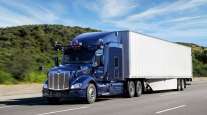Staff Reporter
Teens Impress PennDOT With Truck Parking Challenge Solution

[Stay on top of transportation news: Get TTNews in your inbox.]
Two teens from Lenape Technical School not only won the Pennsylvania Department of Transportation’s school challenge to solve truck parking problems but are now working with the state on construction plans for their unique “Eco-Stops.”
Elijah “Eli” Mumau, in the precision machining program, and Robert John, in biomedical technology, created the winning project. They were mentored by teacher Jason Zimmerman, a blueprint reading and drafting instructor, at Lenape Tech, a top vocational education high school in Ford City, Pa., a suburb of Pittsburgh.
“The students and I know how important our trucking community is. Now more than ever we rely on them to deliver everything that makes our society function; the least we can do is provide them a safe parking area that has access to clean restrooms and a place to get their energy back,” Zimmerman told Transport Topics.
He said the youths “jumped at the opportunity” to take on the transportation department’s challenge to solve truck parking as its 2023 theme in the annual Innovations Challenge. They decided to combine their brainpower to help address parking needs in the New Stanton area of the Pennsylvania Turnpike.
“Eli and Robert were successful in creating a design that is eco-friendly by using materials that require little maintenance, utilize recycled materials like asphalt, passive solar gain for heat, and solar panels to generate electricity,” Zimmerman explained. “This was a student-driven and created masterpiece.”

Their effort required substantial work with help from Zimmerman and other staff supporting the project. They met during school hours, collaborated online and practiced trial runs of the proposal. Others playing a vital role were school Administrative Director Wesley Kuchta, Assistant Director and Principal Jason Gurski and Technology Coordinator Lars Rosell.
“We brainstormed ideas, viewed satellite photos of congested interstates, researched the size requirements for parking areas, created hand-drawn site plans and floor plans of the design, created PowerPoints [presentations] and CAD drawings of the design,” Zimmerman said.
The students found zoning to be the most challenging part because of local ordinances and building codes.
“They took it upon themselves to research these codes and call the local zoning officer in New Stanton. They said it is very difficult to understand all the nuisances in these codes,” Zimmerman noted.

Truck traffic on Interstate 81 in Paxtonia, Pa., one of the 12 areas students could choose from to explore truck parking solutions. (Dough4872 via Wikipedia)
He listed numerous innovative features of the Eco-Stops, which call for 3D printed concrete walls (costing significantly less than traditionally built walls) for the restroom facility and lower-cost recycled asphalt for the parking area and roads.
Energy was another key consideration. A roof over the parking area would use high-efficiency solar panels to assist in electrical usage. It would rely on darker exterior colors to better absorb the sun’s energy for passive solar gain. The interior restroom, with showers, would have lighter interior colors to better reflect light from frosted glass windows and be heated with passive solar energy. Electric vehicle charging ports were also included in the plan.
Providing energy to truckers and reducing vehicle idling was also important. The design calls for integrated HVAC capabilities to be located under solar panels and electrical umbilical cords to hook up to each truck’s cab to provide comfort to drivers when resting.

Gragg Wilson of UPS won grand champion honors at the National Truck Driving Championships. Wilson takes us through the competition's course, successful driving practices and how to attract new drivers. Tune in above or by going to RoadSigns.ttnews.com.
Eco-Stops were also designed to be scalable for greater ease locating them in different places along busy interstates.
“The day that we drove to Harrisburg to present our proposal to the leadership at PennDOT, we saw firsthand how many trucks were parked along the interstate because there was no room in the parking lot areas. Each of those trucks has important cargo along with conscientious professionals behind the wheel. They deserve better,” Zimmerman said.
Mike Carroll, state transportation secretary, reacted to the team’s winning proposal in May when he was then PennDOT’s acting secretary: “It’s incredible to see the next generation of problem-solvers at work trying to address a real transportation issue that we are currently facing. These young minds have been hard at work, and it’s encouraging to see their commitment to working on these issues. The future is in good hands.”
Zimmerman said that winning the challenge has spurred further interest by PennDOT in the Eco-Stops.
“Because Eli and Robert created such an amazing design, PennDOT has asked us to further our learning by working with them to create a project design, proposal and estimate. This extension to the original challenge is already taking place. PennDOT and professionals from Kimley-Horn engineering have put together a 16-week learning activity for Lenape Tech’s winning team,” he said.
Want more news? Listen to today's daily briefing above or go here for more info
Two engineers from PennDOT and a member of its highway safety and traffic operations team will work with both students (now seniors) plus 11th graders Olyvia Burns (construction trades) and Leia Ziembicki-Lewis (natural resources), who joined to “bring their construction, site planning and heavy equipment knowledge to the table,” Zimmerman added.
Each student will work to complete some type of learning activity associated with the proposal. They also will meet regularly with PennDOT staff, who are helping the students take the Eco-Stops to the next level.
“Winning the challenge meant a lot to our students and our local community,” Zimmerman noted. “Lenape Tech is a jewel in Armstrong County, and it is great when our students prove they not only have great technical skills, [but] they also have the academic skills to create presentations and present information to esteemed professionals.”




